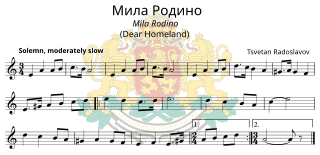
Mila Rodino is the current national anthem of Bulgaria. It is based on the music and text of the song Mila Rodino " by Tsvetan Radoslavov, written and composed as he left to fight in the Serbo-Bulgarian War in 1885. The anthem was adopted in 1964. The text has been changed many times, most recently in 1990.

The Movement for Rights and Freedoms is a centrist political party in Bulgaria.
The official public holidays in Bulgaria are listed in the table below.

Bulgaria elects on national level a head of state - the president - and a legislature. The president is elected for a five-year term directly by the people. The National Assembly has 240 members, elected for a four-year term by proportional representation in multi-seat constituencies with a 4% threshold. Bulgaria has a multi-party system, in which no one party often has a chance of gaining power alone, and parties must work with each to form governments.

The National Assembly is the unicameral parliament and legislative body of the Republic of Bulgaria.

The Principality of Bulgaria was a de facto independent, and de jure vassal state under the suzerainty of the Ottoman Empire. It was established by the Treaty of Berlin in 1878.

The Tarnovo Constitution was the first constitution of Bulgaria.

The Chairperson of the National Assembly of the Republic of Bulgaria presides over the Bulgarian Parliament. The chairperson's term coincides with the term of the assembly, and he or she is chosen by a vote during the opening session.

The Constitution of the Republic of Bulgaria is the supreme and basic law of the Republic of Bulgaria. The current constitution was adopted on 12 July 1991 by the 7th Grand National Assembly of Bulgaria, and defines the country as a unitary parliamentary republic. It has been amended five times.
Desislav Slavov Chukolov is a Bulgarian politician who is one of the leading figures of the Attack.

Grigor Dimitrov Nachovich was a Bulgarian politician and diplomat. One of the early leaders of the Conservative Party and the country's first Minister of Finance, he served as a minister in a number of Bulgarian governments from the late 1879 to 1900, and was also mayor of Sofia in 1896–1897.
The Blue Coalition was a centre-right electoral alliance in Bulgaria, whose members were the Union of Democratic Forces (SDS), Democrats for a Strong Bulgaria (DSB) and three smaller parties. The members of the European Parliament elected on the coalition's list sat with the group of the European People's Party.

The Plovdiv Regional Ethnographic Museum is a museum of ethnography in Plovdiv, Bulgaria. Since 1938, it has occupied the 1847 house of the merchant, Argir Kuyumdzhioglu, in the city's Old Town. The museum features six exhibitions, each occupying a separate room.
The Military ranks of Bulgaria are the military insignia used by the Bulgarian Armed Forces. Being a former communist republic, Bulgaria shares a rank structure similar to that of Russia.
The Chairman (President) of the Republic of the State Council of the People's Republic of Bulgaria was the head of state of Bulgaria from 3 April 1990 to 22 January 1992. The office was known as the Chairman (President) of the People's Republic of Bulgaria until the word "People's" was dropped from the country's name on 15 November 1990. From that point on, the office was simply the Chairman (President) of the Republic of Bulgaria.

Constitutional Assembly elections were held in Bulgaria in June 1881. The body known as the Grand National Assembly was convened for a second time in Svishtov in order to consider the amendments to the constitution proposed by prince Alexander I of Battenberg. The proposed amendments were an echo from the Conservative's requests during the first constitutional assembly elections back in 1879. The amendments proposed included restricting civil liberties, reducing the size of the National Assembly, making the franchise indirect and introducing a state council. These amendments would, in effect, suspend the constitution and turn Bulgaria into an authoritarian dictatorship.

Constitutional Assembly elections were held in Bulgaria in 1886. The body known as the Grand National Assembly was convened for a third time in order to elect a new prince following the abdication of Alexander I. The assembly was composed of 493 representatives and convened on 19 October 1886. It then dissolved itself on 3 August 1887, having elected Ferdinand Saxe-Coburg and Gotha as the new prince of Bulgaria.
The Order "13 Centuries of Bulgaria" was an award of the People's Republic of Bulgaria.

The 1300th Anniversary of the Bulgarian State was a yearlong celebration in 1981 when the Bulgaria celebrated the 1300th anniversary of the establishment of the first Bulgarian state in modern history. There were 23,000 events connected with the 1300th centenary.








